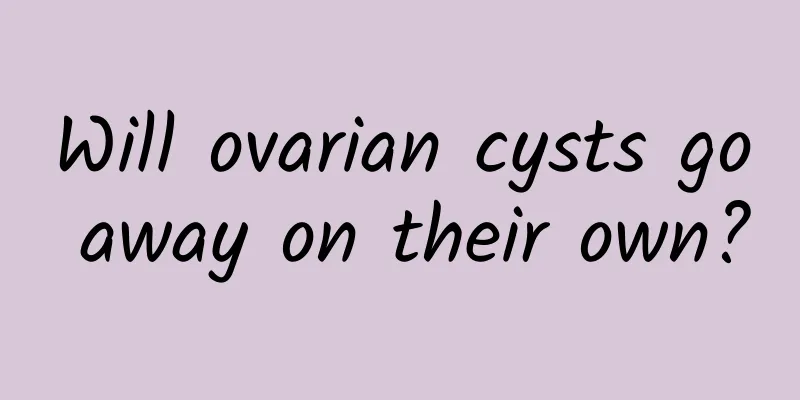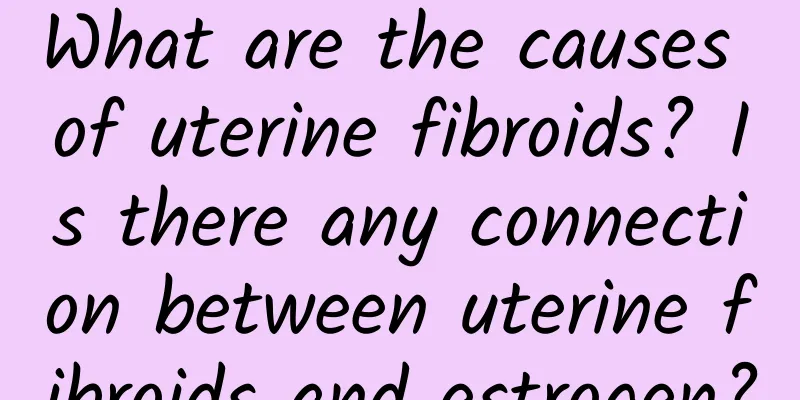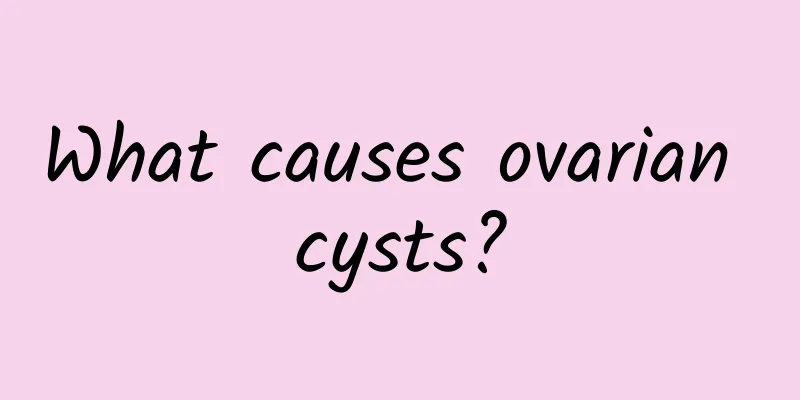Will ovarian cysts go away on their own?

|
From a medical perspective, there are many types of ovarian cysts. Different types of ovarian cysts have different causes and, of course, very different properties. The ovarian cysts we usually refer to are a general term for ovarian cystic tumors and ovarian tumor-like lesions. Some cysts are physiological, and these cysts may regress, while some cysts are ovarian cystic tumors, and it is impossible for ovarian cysts to regress, which requires surgical treatment. Next, let's take a look at the basic symptoms of physiological ovarian cysts and ovarian cystic tumors. Ovarian tumor-like lesions, also known as non-neoplastic ovarian cysts, mostly occur in women of childbearing age, including follicular cysts, corpus luteum cysts, lutein cysts, polycystic ovaries, ovarian chocolate cysts, etc. Follicular cysts and corpus luteum cysts appear at different stages of the menstrual cycle of normal women of childbearing age. They are physiological retention cysts, often single, but multiple follicular cysts and corpus luteum cysts can also occur. The diameter is generally 1 to 3 cm, occasionally up to 5 to 6 cm. Most people have no obvious symptoms and are only discovered during gynecological examinations. Occasionally, cysts rupture and cause bleeding and pain. Among them, follicular cysts are common ovarian cysts, which are formed when mature follicles do not ovulate or atretic follicles persist, causing follicular fluid retention. Most ovarian cysts can disappear within two months without special treatment. Lutein cysts are more common in trophoblastic tumors (such as hydatidiform mole and choriocarcinoma). They are formed by the luteinization of theca cells stimulated by a large amount of chorionic gonadotropin. After the hydatidiform mole is expelled by uterine curettage or after the treatment of choriocarcinoma, lutein cysts will disappear as ovarian cysts. As for polycystic ovaries and ovarian chocolate cysts, which are benign ovarian lesions, ovarian cysts will also disappear. With the improvement of medical technology, the detection rate of ovarian cysts during gynecological examinations and ultrasound examinations is very high. Patients do not need to worry too much and should observe for 1 to 2 months. Whether the ovarian tumor will disappear can be confirmed by the symptoms. If the cyst persists and grows larger, it should be considered that the ovarian cyst cannot disappear. It may not be a physiological ovarian cyst. If an ovarian cystic tumor is found, whether it is benign or malignant, the ovarian cyst cannot disappear, and surgical treatment should be performed as soon as possible. The above are some specific instructions on the disappearance of ovarian cysts. I believe that after reading the above content, you should have a general understanding of the disappearance of ovarian cysts. I hope it will bring some help to your life and health. For more information, please visit the ovarian cyst disease special topic at http://www..com.cn/fuke/ncnn/ or consult an expert for free. The expert will then give a detailed answer based on the patient's specific situation. |
<<: Drugs cannot completely eradicate uterine fibroids
>>: Correct treatment of dull complexion caused by vulvar leukoplakia
Recommend
What should I do if I have uterine fibroids? How should I treat uterine fibroids?
Uterine fibroids often cause serious physical har...
Is it easy to get pregnant with cervicitis and endometritis?
Both cervicitis and endometritis may affect pregn...
[Video version] Xia Hui ~ Are these 3 foods more nutritious after being sprouted? One picture will tell you in seconds: eating this way can improve immunity and help metabolism
Even if the potatoes at home have sprouted, you a...
Will the allowable radiation level for food be relaxed? Department of Health: Standards are becoming stricter
The Consumer Foundation questioned the Department...
What are the symptoms of endometriosis?
Endometriosis is a gynecological disease. Endomet...
Prevent high blood lipids and lose weight healthily! 3 Easy Lentil Recipes
When dining in Korea, there are usually side dish...
Expert introduction - effective ways to prevent uterine fibroids.
Uterine fibroids are a common tumor in women. The...
What can I eat to repair uterine fibroids faster? What can I eat to improve uterine fibroids?
What can I eat to repair uterine fibroids faster?...
Ovarian dysfunction is the key cause of cervical hypertrophy
Cervical hypertrophy is also a common disease in ...
Uterine fibroids can also cause irregular vaginal bleeding
Uterine fibroids can also cause irregular vaginal...
How to prevent pelvic inflammatory disease
Pelvic inflammatory disease is a common gynecolog...
What should women do if they have cervical erosion?
Cervical erosion is called cervical columnar epit...
What to do if you have irregular menstruation after wearing the ring
What should I do if I have irregular menstruation...
Diagnosis of cervical erosion
Cervical erosion is one of the local characterist...
What are the symptoms of vaginitis in pregnant women?
There are many classifications of vaginitis, such...









